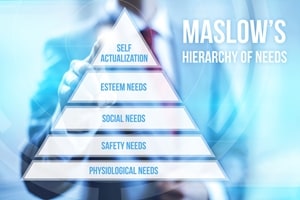What is the relevance of Maslow’s hierarchy of needs in performance management?
Anyone who has studied management or psychology at university will be familiar with the concept of Maslow’s hierarchy of needs. A staple of human motivation theory, the classic triangular diagram outlines the intrinsic needs that fuel every human being, and their order of significance.
For those unfamiliar with the theory, it involves a pyramid split horizontally into five levels, each representing a unique type of need. From the bottom up, they are physiological, safety, social, esteem and self-actualisation. When one set of needs (starting with the first, physiological) is satisfied, a person can then move onto addressing the next level of needs until they reach the top of the pyramid.
Each of the five levels demand equal amounts of analysis and study, but it is that penultimate step – the need for esteem – that can help explain why strengths-based 360 feedback surveys are so effective.
Essentially, this fourth level revolves around the notion that all humans have a desire to be recognised and respected for their efforts. People invariably have a thirst for a sense of achievement, and their judgement of themselves is based on how others view them.
Maslow’s theory states that if this need is not satisfied, people cannot progress to the next and final level – self-actualisation needs, the fulfilment of which is critical to some of the most important workplace skills such as problem-solving and creativity.
And what better way is there of meeting someone’s esteem needs – and their desire for recognition, respect and confidence – than highlighting their strengths and capabilities in the workplace? Rather than focusing predomintly on weaknesses, which often further dampens performance, a 360 degree feedback survey based on Leaderskill’s Leader/Manager Model™ emphasises the positives and along with specific areas for development. The feedback process suggests constructive steps that managers can take to further improve their performance, while at the same time ensuring that their Maslow-based psychological needs are met.








